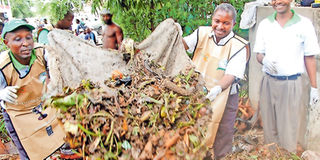Agronomist's notebook: Six practices that destroy soil fertility

Members of the Green Town Movement make compost manure in Kilifi County, in this past photo. Compost manure helps in improving the fertility of soil. FILE PHOTO | NMG
What you need to know:
- Many farmers, knowingly or unknowingly, engage in farming practices or activities that affect organic matter in soil resulting to a decline in soil fertility.
- Burning also reduces the soil moisture content and increase the soil temperatures affecting the activities of micro-organisms in the soil.
- Intercropping should, therefore, be practised, for instance, by planting maize and beans, with the latter helping to fix nitrogen which contributes to the general soil fertility.
- While using drip irrigation system, farmers should embrace fertigation with a soluble fertiliser such as urea since it’s cheaper.
Soil fertility refers to the ability of the soil to supply nutrients and water to sustain plant growth.
Organic matter plays a vital role in determining soil fertility, which consists of plants and animal residues at different stages of decomposition.
The composition of the organic matter and the breakdown rate affect the soil structure, porosity and soil moisture-holding capacity.
Many farmers, knowingly or unknowingly, engage in farming practices or activities that affect organic matter in soil resulting to a decline in soil fertility.
While on a visit to a farm recently, I found the farmer busy preparing the land for planting.
From a distance, I could see fumes of smoke from the farm, an indication that she was burning crop residues.
This is an old method of clearing land before ploughing but it is still being practised to date, especially at this particular time as farmers prepare their land for long rains season planting.
Burning affects soil organic matter since it kills all the living organism in the soil reducing fertility.
Normally, the organic matter in the soil buffers the pH and reduces the salinity effect. By burning the crop residue, we destroy the organic matter and leave ash that increases the soil pH.
Burning also reduces the soil moisture content and increase the soil temperatures affecting the activities of micro-organisms in the soil.
Plant residue should always be incorporated in the soil to increase the organic matter content, which improves the physical condition of the soil particularly the structure.
Deep ploughing also affects decomposition of organic matter and leaves the ground bare facilitating wind and water erosion.
Conservation agriculture methods that entail a combination of different techniques such as minimum tillage or no-tillage with a protective cover crop help minimise nutrients loss.
Continuous cropping or monoculture also leads to decrease in the nutrient content level and total soil fertility, ultimately resulting in reduction of crop yields.
This is due to nutrient depletion in the soils following continuous absorption of similar nutrients from the root zones and no efforts to replenish them.
Intercropping should, therefore, be practised, for instance, by planting maize and beans, with the latter helping to fix nitrogen which contributes to the general soil fertility.
ORGANIC MANURE IMPROVES SOIL FERTILITY
Planting different crops routinely further allows the land to remain fertile since not all crop nutrients are used each season.
A farmer can, therefore, adapt three to four rotation crops such planting beans, sukuma wiki (collard green), tomatoes and onions.
It’s critical for a farmer to understand the components and characteristics of different fertilisers since wrong methods of application unknowingly results to decline in soil fertility.
Application of nitrogenous fertilisers during planting results to leaching of nutrients since they are highly soluble in water hence go beyond the root zones.
Normally, nitrogenous fertilisers facilitate the vegetative growth of the plants thus using it as a basal fertiliser will not benefit the plant as expected.
Apply phosphate fertilisers during planting since they facilitate roots development and are not soluble in water thus are not easily leached.
Nitrogenous fertilisers are highly hygroscopic, therefore, leaving them uncovered results to nutrients loss before the plants take them.
While using drip irrigation system, farmers should embrace fertigation with a soluble fertiliser such as urea since it’s cheaper.
Using fertigation method to apply insoluble fertilisers such as DAP results to blocking of the drip lines emitter hence it is not encouraged.
Use of different fertilisers also affects the soil pH, for example, use of CAN increases the pH while the use of urea decreases the pH.
Use of either acidic or basic fertiliser changes the pH, which in turn affects the activities of micro-organisms resulting in a decrease in organic matter.
A farmer should be aware of the fertilisers he uses depending on the soil status.
Farmers should, therefore, observe the chemical usage rates to avoid overuse and proper disposal of the chemical bottles to ensure sustainability by taking care of the environment.
One should also use manure as this helps to increase the soil organic matter and builds the structure. Growing crops up to vegetative stages and then applying organic manure plays a critical role in improving the soil fertility





